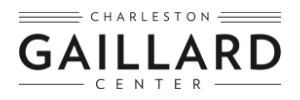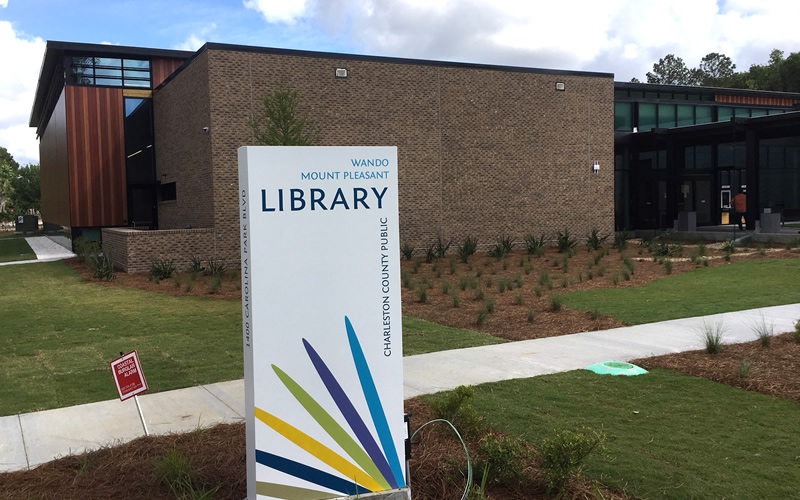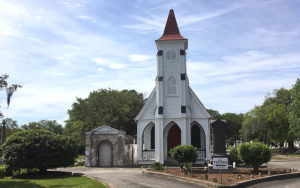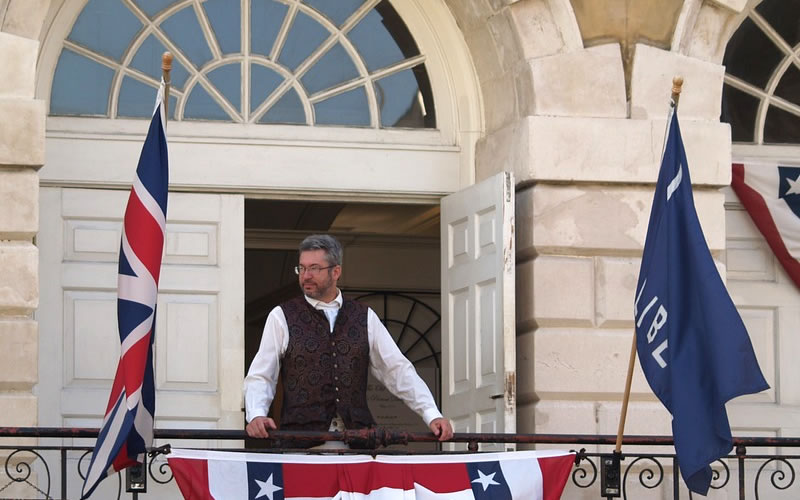HONORING OUR HEROES. Let’s all take a few quiet moments today, Memorial Day, to honor Americans in our armed forces who gave their lives for our country. Thank you. Rest in peace. Learn more about Memorial Day.
IN THIS EDITION FOCUS: Keep your pets cool in hot weather
FOCUS: Keep your pets cool in hot weather
COMMENTARY, Brack: State budget shows legislators’ values
IN THE SPOTLIGHT: Charleston Gaillard Center
GOOD NEWS: First of new libraries to open June 10 in Mount Pleasant
FEEDBACK: Stop political attacks during council meetings
MYSTERY PHOTO: This mystery should be pretty easy
S.C. ENCYCLOPEDIA: Education in South Carolina, part 4
CALENDAR: Piccolo Spoleto and Spoleto Festival USA are in high gear!
FOCUSFOCUS: Keep your pets cool in hot weather
Staff reports | With record-breaking heat arriving in the Lowcountry earlier than usual, pet owners are advised by the Charleston Animal Society, which has issued an early heat advisory, to make sure to keep their pets cool in hot weather. These tips are good any time of the summer.
Keep animals indoors and limit outdoor activities during a heat wave. People are urged to leave pets at home and not take them outside to the beach or other events. Even swimming, a dog can overheat.
“We know it’s always fun to take our pets with us, but we have to put their well-being first,” Dr. Lucy Fuller, senior director of veterinary care at Charleston Animal Society, said in a news release. “We are also reminding everyone not to leave pets in cars – even for a quick run into a store – it is just too dangerous.”
When your pet is outdoors, it should always have access to water. Pets should also have a shady place to escape the sun if outside and they should never linger on hot asphalt during periods of extreme heat. This can cause an animal to heat up quickly, and sensitive paw pads can burn.
Charleston Animal Society also is urging caretakers of working animals, such as horses and mules that pull tour carriages downtown, to lighten their animals’ workloads and schedules. While the Charleston City ordinance allows tour carriage operators to host tours until a heat index temperature of 110 degrees, Charleston Animal Society said in the release that it believes that this temperature is much too high for the safety of these horses and mules.
Safety tips
- Keep animals cool. Animals can become dehydrated quickly, so it is imperative to provide them with plenty of water when it is hot outdoors.
- Spot the symptoms. Signs of overheating in pets include increased heart rate, excessive drooling and panting, difficulty breathing, weakness, collapsing, elevated body temperature (over 104 degrees), and even seizures. Even if swimming, a dog can easily get sick in the heat.
- The young and the old are at the highest risk for heat illnesses. Be careful with older pets and with puppies and kittens, by limiting their time outdoors.
- “Cracking a window” DOES NOT WORK. Plain and simple, cracking the windows in a vehicle makes little to no difference to lessen the temperature within it. On a hot day, the temperature in your vehicle can exceed 120 degrees within 20 minutes, which can be fatal to your pet. If you see a pet in a locked car, dial 911.
- More info: CharlestonAnimalSociety.org | WATCH this video.
- Have a comment? Send to: editor@charlestoncurrents.com
BRACK: State budget shows legislators’ values
By Andy Brack, editor and publisher | There’s a lot that goes on in a legislative session: Thousands of bills are filed. Hundreds of news stories are written about those bills. Scores of committee meetings underscore why making laws is as unsightly as making sausage.
 Through it all after several months of work, much hot air was expended. Tempers flared. Filibusterers filibustered. Lobbyists lobbied. Visitors gawked. And a few laws got passed.
Through it all after several months of work, much hot air was expended. Tempers flared. Filibusterers filibustered. Lobbyists lobbied. Visitors gawked. And a few laws got passed.
In 2019, legislators agreed enough to pass 113 measures – everything from the $9 billion budget to rejiggering voting precincts in Anderson, Greenwood, Dorchester, Pickens, Abbeville and Dillon counties. In fact, they seemed to like fiddling so much with Greenwood County’s precinct maps that they did it twice, first in March and later as the session was coming to a close.
The biggest thing that happens annually in any legislative session is passage of how the state will spend the money it collects in taxes to pay for government services. Because budgets are how we prioritize what’s important, legislators essentially are monetizing core values when they approve spending legislation. As religious writer and activist Jim Wallis has written, “Any budget is a moral statement of priorities, whether it’s a budget created by an individual, a family, a school, a city or a nation. It tells us, mathematically, what areas, issues, things, or people are most important to the creators of that budget, and which are least important.”
So in the 2019-20 budget, what did legislators say was important in spending what we sent to the government? Here’s a list of how they agreed to spend new monies, including a $1 billion surplus:
Employee pay. Current public school teachers will get a 4 percent pay hike and new teachers will start at $35,000 a year, up $3,000. Total cost: $159 million. (Teachers also will get a 2 percent boost that all state employees get ($41 million total), plus a recurring increase for health cost increases that will cost another $50 million.) The state also added $32 million to its contribution to underfunded state pensions.
Schools. Lawmakers hiked the base student cost slightly, but still are underfunding public education by millions of dollars based on a funding formula. An extra $10 million will go to pay for police in school districts that can’t afford them. Another $19 million went to school bus purchases from the lottery.
Higher education. An extra $44 million will go to state public colleges and universities, with a provision that limits higher tuition for in-state students. Additionally, the legislature added $112 million for long-deferred capital needs at college buildings. In the past, there was talk of using borrowed funds for bonding to deal with billions in needs from colleges.
Equipment. The state set aside $40 million to buy new voting machines to replace the dinosaurs now being used. Lawmakers finally agreed to spend $29 million on a child support enforcement computer system, something long required by the federal government. (We’re the only state without the right system and have wasted lots of money and time trying to get it on the cheap.)
Gimmick. Lawmakers agreed to send $50 to each taxpayer who files a tax return. Cost: $67 million. Impact per household: $4 per month. Spin: It’s nothing more than a political bribe to make you think you’re getting something when you probably won’t feel it at all.
Reserves. Lawmakers fully funded state reserve funds, adding $37 million to rainy-day pots that now total $569 million. With summer weather getting more erratic and a trade war impacting the economy, it’s wise to keep reserves topped up in case something unexpected happens.
So what does all of this spending tell us? Mostly, it shows the state is finally ponying up for long ignored needs — everything from schools to buildings to things we should have done a long time ago. Thank goodness there was a surplus this year to help jumpstart the state.
Now it’s time for tough discussions to pass real and comprehensive tax reform so that we can keep up with existing needs – and not get behind the eight ball again so that we have to wait a generation before doing what we should have done in the first place.
- Andy Brack’s new book, “We Can Do Better, South Carolina,” is now available for $14.99 in paperback via Amazon.
- Have a comment? Send to: editor@charlestoncurrents.com
SPOTLIGHT: Charleston Gaillard Center
 Charleston Gaillard Center provides the Lowcountry with a world-class performance hall, elegant venue space and vibrant educational opportunities that inspire dynamic community throughout the area through the power of the performing arts. The Center’s vision is to enrich the diverse community of Charleston with artistic and cultural experiences that are accessible and unique, and to serve as an educational resource for generations to come.
Charleston Gaillard Center provides the Lowcountry with a world-class performance hall, elegant venue space and vibrant educational opportunities that inspire dynamic community throughout the area through the power of the performing arts. The Center’s vision is to enrich the diverse community of Charleston with artistic and cultural experiences that are accessible and unique, and to serve as an educational resource for generations to come.
Did you know that the Charleston Gaillard Center is a 501c3 non-profit that works with over 25,000 students each year from the tri-county area? Promoting education is one of the core values of the Charleston Gaillard Center and an integral part of our mission. By broadening the reach of arts-education in the Lowcountry the Gaillard Center encourages learning through the arts and serves as a powerful tool for student achievement and personal development while providing people of all ages with the opportunity to cultivate and grow their talents and appreciation for the arts. To learn more about our education initiative, click here: www.gaillardcenter.org/outreach.
For more information, click the links below:
- Buy tickets and see our great events
- Become a member today
- Plan your event at the Charleston Gaillard Center
- Learn about our education and community programs
- Contact the Gaillard Center.
- To meet all of our underwriters, click here.
First of new libraries to open June 10 in Mount Pleasant

Staff reports | The first new library of five being built through a $108.5 million county bond referendum will open 10 a.m. June 10 following a 9 a.m. ribbon-cutting ceremony. The new 40,000-square-foot Wando Mount Pleasant Library is located at 1400 Carolina Park Boulevard in northern Mount Pleasant.
“We are thrilled with this example of library innovation and accessibility for all of Charleston County’s residents,” said Charleston County Public Library Executive Director Angela Craig. “This is one of many new facilities launching system-wide that will provide exceptional library service, as well as access to emerging technologies and resources that the public can embrace as their own.”
The new branch was designed by architecture firm LS3P and built by MB Kahn. Carolina Park Development donated the land for the facility, along with $1.2 million toward its construction, which began in December 2017.
The new library features a 250-seat auditorium, study rooms, self-check kiosks, a digital media recording studio plus two editing labs, maker spaces, a storytime room, a teen lounge and a computer lab.
Patrons will have the opportunity to attend several opening day programs including a special storytime featuring library mascot, Owlbert, receive free Owlbert books, learn about the areas rich sweetgrass basket history, attend author talks and hear a historical account of the 10 Mile of Mount Pleasant area by library historian Dr. Nic Butler.
In the months ahead, newly-built libraries are slated to open in James Island, Hollywood, West Ashley and North Charleston.
In recent Good News:
![]() Beachwalker Park open. Kiawah Beachwalker Park is again open despite some renovations to improve facilities and parking that are continuing. Showers and changing rooms are still under construction and will not be available. But the park will be providing freshwater hoses that patrons may use to rinse their feet and beach items. Lifeguards are on duty. Beach chair/umbrella rentals and the snack bar also is open. In the days ahead during final construction, the park may have to be closed for a limited time, which should encourage park-goers to sign up for the park’s Notify Me alert system to learn of any additional closures. Go to CharlestonCountyParks.com/Notifyme to register for the alert.
Beachwalker Park open. Kiawah Beachwalker Park is again open despite some renovations to improve facilities and parking that are continuing. Showers and changing rooms are still under construction and will not be available. But the park will be providing freshwater hoses that patrons may use to rinse their feet and beach items. Lifeguards are on duty. Beach chair/umbrella rentals and the snack bar also is open. In the days ahead during final construction, the park may have to be closed for a limited time, which should encourage park-goers to sign up for the park’s Notify Me alert system to learn of any additional closures. Go to CharlestonCountyParks.com/Notifyme to register for the alert.
Your essential mission. Best-selling author Greg McKeown, who was 2019 headlining speaker at Charleston’s DigSouth 2019, joins SouthPod host Jon Yarian to explain the steps to reaching essentialism and why even technology entrepreneurs and business leaders need to perfect this practice. “This is the work of life: Figure out your essential mission and live it,” says McKeown, author of Essentialism The Disciplined Pursuit of Less. Listen to the podcast.
Hurricane season begins June 1. Sunday begins S.C. Hurricane Preparedness Week leading up to June 1, the official date of hurricane season. This week, the S.C. Emergency Management Division and local emergency managers will be highlighting ways daily that residents can prepare for the 2019 Atlantic hurricane season. State officials are urging residents to download the South Carolina Emergency Manager mobile app as your official tool for emergency planning and follow the official @SCEMD accounts on Facebook, Twitter and Instagram to stay connected. Download the guide here.
Tomlin to chair state workforce development board. Gov. Henry McMaster has appointed Donald R. Tomlin, Jr. to serve as chairman of the S.C. State Workforce Development Board. Tomlin is a longtime South Carolina-based investor and entrepreneur, and most recently served as the chairman of the board of the South Carolina State Housing, Finance and Development Authority.
GOP women. Statehouse Report correspondent Lindsay Street has noticed that GOP women in the S.C. House and Senate provide a lot more leadership than they’re given credit for: “Navigating tricky political terrain is just another day at the Statehouse for a distinct minority in elected office: Republican women. In red South Carolina, there are two Republican women in the S.C. Senate (4 percent of the chamber) and 11 Republican women in the S.C. House (about 9 percent of the chamber). Republican men account for 54 percent of the Senate (25 of 46 members), and 56 percent of the House (69 of 124 members).” Read more.
FEEDBACKStop political attacks during council meetings
To the editor:
![]() These political attacks on Mayor John Tecklenburg and his wife should be reserved for the fall campaign and not spewed in City Council meetings. That only offers distractions and delays discussion of the very serious issue before the city. Get to work, gentlemen, Save the politics for campaign debates and on your own dime, not the taxpayers.
These political attacks on Mayor John Tecklenburg and his wife should be reserved for the fall campaign and not spewed in City Council meetings. That only offers distractions and delays discussion of the very serious issue before the city. Get to work, gentlemen, Save the politics for campaign debates and on your own dime, not the taxpayers.
— Bud Ferillo, Columbia, S.C.
Send us your thoughts
We’d love to get your impact in one or more ways:
Send us a letter: We love hearing from readers. Comments are limited to 250 words or less. Please include your name and contact information. Send your letters to: editor@charlestoncurrents.com. | Read our feedback policy.
Tell us what you love about the Lowcountry. Send a short comment – 100 words to 150 words – that describes something you really enjoy about the Lowcountry. It can be big or small. It can be a place, a thing or something you see. It might the bakery where you get a morning croissant or a business or government entity doing a good job. We’ll highlight your entry in a coming issue of Charleston Currents. We look forward to hearing from you.
MYSTERYThis mystery should be pretty easy
Here’s a mystery that should be pretty easy for anyone who has lived in or visited Charleston. So how about identifying it AND giving us one fun fact about this place. Send your guess to editor@charlestoncurrents.com. And don’t forget to include your name and the town in which you live.
Our previous Mystery Photo
 Our May 20 mystery, “Narrow, tall building,” seemed to stump many readers, based on the fewer-than-normal responses we got. It shows a chapel in Bethany Cemetery, a Lutheran site near Charleston’s Magnolia Cemetery. The chapel now apparently is used as office space, while a former receiving tomb is a storage space, we hear.
Our May 20 mystery, “Narrow, tall building,” seemed to stump many readers, based on the fewer-than-normal responses we got. It shows a chapel in Bethany Cemetery, a Lutheran site near Charleston’s Magnolia Cemetery. The chapel now apparently is used as office space, while a former receiving tomb is a storage space, we hear.
Congratulations to Paul Wieters and Stephen Yetman, both of Charleston; George Graf of Palmyra, Va.; Evan D. Cook of James Island; Chris Brooks of Mount Pleasant; and Marnie Huger of Richmond, Va. Congratulations, all! This was a tough one.
Also thanks to Graf for this detail about the cemetery: “According to Adventures in Cemetery Hopping, St. Matthew’s Lutheran Church opened Bethany Cemetery in 1856 after its first cemetery (Hampstedt Cemetery) on Reid Street was filled after several yellow fever outbreaks devastated Charleston’s immigrant German population. In the 1930s, the property Hampstedt Cemetery was located on was sold at auction and divided into lots when assessments for a street paving project weren’t paid.
“Lo and behold, the Charleston Housing Authority discovered human remains on the property in 1981 whilst preparing to build on it. How they didn’t know seems a bit farfetched but nevertheless, close to 500 of those graves were moved to Bethany Cemetery in 2009. What was a chapel at one time is now the cemetery office. It is not in the best condition, nor is the receiving tomb beside it. The receiving tomb is now used as a maintenance building to store equipment, it appears. These are mostly found in the North because snow/ice would freeze the ground, causing delays in burial. South Carolina doesn’t have that problem. But my guess is that like Atlanta’s Westview, sometimes they had long stretches of rain and burials had to be delayed due to muddy conditions. They had to store the bodies somewhere.”
- Send us a mystery: If you have a photo that you believe will stump readers, send it along (but make sure to tell us what it is because it may stump us too!) Send it along to editor@charlestoncurrents.com.
HISTORY: Education in South Carolina
S.C. Encyclopedia, part 4 of 4 | The South Carolina Education Improvement Act (EIA) in 1984 and the 1989 Target 2000: School Reform for the Next Decade were comprehensive public school reform packages that brought South Carolina into the mainstream of educational reform.
Funds were allocated for half-day child-development programs, kindergarten for all five-year-olds, special programs for gifted and talented students, and remedial programs for those children who did not pass the basic skills exam. Higher-order thinking skills were required to be included in the school curricula, as well as discipline-based art, music, dance, and drama. Requirements for graduation increased, and dropout- prevention programs were funded. Schools, teachers, and principals were offered monetary bonuses for good test scores.
The EIA represented the largest increase in school funding per child in the country. On the other hand, hundreds of South Carolina teachers (most of them African American) were slated to lose their jobs because they were not meeting the standards set by the EIA, and African American students made up a disproportionate number of those failing the exit exam. By 1989 the state’s graduation rate had risen three percent, and although South Carolina continued to rank last in SAT scores, the state’s average had the largest increase of any state in six years.
During the 1990s a series of laws addressed specific school issues. The primary purpose of the Early Childhood Development and Academic Assistance Act of 1993 was to place emphasis on early childhood education and remediation in the elementary grades. It promoted developmentally appropriate curricula and parenting/family literacy.
The 1994 School-to-Work Transition Act clarified the connection between school and the workplace by abolishing the “general track,” which did not prepare students for either technical vocations or college, and requiring that all students be placed in either a “tech prep” or “college prep” curriculum. These curricula were to provide rigorous preparation in marketable occupational and academic skills.
The Charter School Act of 1996 was intended to provide an opportunity for flexible, innovative, and substantially deregulated public schools. Competition with these schools was seen as a healthy stimulant for change and improvement.
The South Carolina Education Accountability Act (EAA) of 1998 created a performance-based accountability system by setting grade-level standards, requiring district and school report cards to be published in newspapers beginning in 2001, and creating an over- sight committee to monitor and evaluate the implementation of the act. School-readiness tests, grade-level academic standards, and standard-based assessments were required, with academic plans for each child who did not perform at grade level.
The Palmetto Achievement Challenge Tests (PACT) were developed in-state as the standards-based assessment tool, replacing the BSAP. The first PACT testing in 1999 indicated that a third of South Carolina’s elementary- and middle-school students were not prepared to enter the next grade level. To enable the state to compare its students with others across the country, Terra Nova, a nationally standardized test, replaced the Stanford 8 (used 1990–1994) and the Metropolitan Achievement Test 7 (used 1995–1998). Terra Nova was administered to around thirteen percent of students in grades three, six, and nine for the first time in April 1999.
The end of the century saw two more education acts, the First Steps to School Readiness Act of 1999 and the Parental Involvement in Their Children’s Education Act of 2000. First Steps was intended to ensure that children arrived at first grade healthy and ready to learn. Its goals included supporting parents in optimizing their children’s development through access to health care, nutrition, and preschool programs.
The Parental Involvement Act was intended to heighten parental awareness of the importance of their role in the development and education of their children. Schools were challenged to become more “parent friendly.” Both acts reflected the state’s awareness and adoption of contemporary educational research and its implications for schooling. While years of neglect cannot be remedied overnight, the state is clearly expending great efforts to foster effective twenty-first-century schools.
— Excerpted from an entry by Deborah M. Switzer and Robert P. Green Jr. This entry may not have been updated since 2006. To read more about this or 2,000 other entries about South Carolina, check out The South Carolina Encyclopedia, published in 2006 by USC Press. (Information used by permission.)
ON THE CALENDARCALENDAR: Piccolo Spoleto and Spoleto Festival USA are in high gear!
AT THRESHOLD: Charleston-based musical quintet Terraphonics will perform 7:30 p.m. and 9:30 p.m. on June 4 and June 6 at Threshold Repertory Theatre, 84 1/2 Society St. in downtown Charleston. Combining contemporary jazz and downtempo with elements of African, Latin and East Asian music, the band weaves a mood that supersedes genre or border, yet is cohesively tied together through hypnotic rhythms, emotive instrumental melodies, and Shaniqua McCant’s entrancing and unique vocal style. The rhythm section features Brandon Brooks on drums, Thomas Kenney on guitar, Jonathan Lovett on keys, and Alex Kellner on bass. Tickets are $25 each; purchase at www.piccolospoleto.com. (Photo provided; photo by Everett Zuraw.)
Staff reports | It’s a busy time around Charleston with hundreds of performances after Spoleto Festival USA and its city-based companion, Piccolo Spoleto, got underway Friday. There’s lots more to do in coming weeks too:
Piccolo Spoleto: Through June 9, all over Charleston. There’s more than 500 events during the city’s 17-day companion festival to Spoleto Festival USA. Check out our earlier coverage, which has lots of ideas and links for just the right thing for you to do. Still stymied? Find a free day on your calendar and check out the Piccolo calendar for something that’s on. Be spontaneous. You’ll have a great time. More.
Spoleto Festival USA: Through June 9, all over the Charleston area. The sheer quality of the music, art and culture in Charleston for 17 days is mind-blowing. These shows cost more than the sister Piccolo Festival, but hey, this is the main draw that brings in people from all over the world. More: SpoletoFestivalUSA.org.
Tea room at Grace: 11:30 a.m. to 2 p.m. Through June 8 (except June 2). Lunch and a gift shop. See menu here. Grace Church Cathedral. 98 Wentworth St., Charleston.
Fair book signing: 5:30 p.m., May 29, Blue Bicycle Books, 420 King St., Charleston. Join J. Henry Fair to celebrate On the Edge: Combahee to Winyah, hiss new photo book that captures the state’s changing coastline. All the revenue from sales of On the Edge will benefit the Coastal Conservation League and support its mission to protect South Carolina’s coastal resources and communities.
Events at the Gaillard. Check out these awesome coming events at the Charleston Gaillard Center, 95 Calhoun St., Charleston:
Songs of America: Jon Meacham and Tim McGraw: 7:30 p.m., June 11. Join Grammy Award-winning Tim McGraw and Pulitzer Prize-winning author Jon Meacham as they explore American history through music. Tickets are $65 to $350. More.
TheSkimm Night Out. 7:30 p.m., June 25. The founders of theSkimm are coming to your city for a fun night out, full of empowering conversation, networking, cheering, and more to celebrate their new book, How to Skimm Your Life. Tickets are $48 to $150. More.
Jennifer Holliday. 4 p.m. Aug. 2. Grammy and Tony award-winning singer and actor Jennifer Holliday will show off her voice for a one hour singing performance to close out the 2019 Lowcountry Mental Health Conference. She will also be taking time to share her personal story and struggles with depression while talking about the work she is doing to bring awareness to mental health issues. More info and tickets.
Hat Day in the Sun: 11:30 a.m., June 21, Marion Square, King Street, Charleston. Once again, the Hat Ladies will be distributing FREE hats to men, women and children to emphasize the importance of hat wearing for sun protection. They’ll hand out hats as long as supplies last; one hat per customer. More: www.hatladies.org.
Early morning bird walks at Caw Caw: 8:30 a.m. every Wednesday and Saturday, Caw Caw Interpretive Center, Ravenel. You can learn about habitats and birds, butterflies and other organisms in this two-hour session. Registration not required, but participants are to be 15 and up. $10 per person or free to Gold Pass holders. More: http://www.CharlestonCountyParks.com.
AREA MARKETS
![]() TUESDAYS. The Mount Pleasant Farmers Market is every Tuesday from 3:30 p.m. to 7 p.m. at the market pavilion at Moultrie Middle School, 645 Coleman Blvd., Mount Pleasant. Free parking. Lots of activities. More info.
TUESDAYS. The Mount Pleasant Farmers Market is every Tuesday from 3:30 p.m. to 7 p.m. at the market pavilion at Moultrie Middle School, 645 Coleman Blvd., Mount Pleasant. Free parking. Lots of activities. More info.
WEDNESDAYS. The West Ashley Farmers Market is every Wednesday from 3 p.m. to 7 p.m. in Ackerman Park off Sycamore Avenue in West Ashley. The last week of the market will be the first week of October. More.
FRIDAYS/SATURDAYS: Night Market. Every Friday and Saturday from 6:30 p.m. to 10:30 p.m. for the rest of the year, you can shop with 108 vendors, including artists and craftsmen, at the night market on Market Street between East Bay and Church streets. It’s more than four blocks of local shopping and fun. Free.
SATURDAYS: Johns Island Farmers Market operates each Saturday from 9:30 a.m. to 1:30 p.m. year-round with more than 50 local farmers and vendors, food trucks, music and more. The market is located on the campus of Charleston Collegiate School, 2024 Academy Road, Johns Island
SATURDAYS: The Charleston Farmers Market is opens 8 a.m. to 2 p.m. in Marion Square each Saturday through Nov. 30. More info.
- If you have an event to list on our calendar, please send it to feedback@charlestoncurrents.com for consideration. The calendar is updated weekly on Mondays.
 If you like what you’ve been reading, how about considering a contribution so that we can continue to providing you with good news about Charleston and the Lowcountry. Interested? Just click the image below.
If you like what you’ve been reading, how about considering a contribution so that we can continue to providing you with good news about Charleston and the Lowcountry. Interested? Just click the image below.
Now out in paperbrack, err, paperback
 We Can Do Better, South Carolina! offers incisive commentaries by editor and publisher Andy Brack on the American South, the common good and interesting South Carolina leaders, such as former U.S. Sen. Fritz Hollings, civil rights advocate Septima Clark, former S.C. Gov. David Beasley and more. There also are discussions on civil rights struggles with which the Palmetto State continues to grapple. as well as commentaries on politics, governments, the hangovers of South Carolina’s past and her future opportunities.
We Can Do Better, South Carolina! offers incisive commentaries by editor and publisher Andy Brack on the American South, the common good and interesting South Carolina leaders, such as former U.S. Sen. Fritz Hollings, civil rights advocate Septima Clark, former S.C. Gov. David Beasley and more. There also are discussions on civil rights struggles with which the Palmetto State continues to grapple. as well as commentaries on politics, governments, the hangovers of South Carolina’s past and her future opportunities.
We Can Do Better, South Carolina! is available for $14.99 in paperback or as a Kindle book for $7.99. Click here to purchase your copy. A paperback version will be ready for order soon.
- If you have a comment or questions about the book, please let us know at: editor@charlestoncurrents.com
OUR UNDERWRITERS
Charleston Currents is an underwriter-supported weekly online journal of good news about the Charleston area and Lowcountry of South Carolina.
- Meet our underwriters
- To learn more about how your organization or business can benefit, click here to contact us. Or give us a holler on the phone at: 843.670.3996.
OUR TEAM
Charleston Currents offers insightful community comment and good news on events each week. It cuts through the information clutter to offer the best of what’s happening locally.
- Mailing address: O. Box. 22261 | Charleston, SC 29413
- Phone: 670.3996
Charleston Currents is provided to you weekly by:
- Editor and publisher: Andy Brack, 843.670.3996
- Contributing editor, common good, Fred Palm
- Contributing editor, money: Kyra Morris
- Contributing editor, Palmetto Poem: Marjory Wentworth
- Contributing editor, real estate: Digit Matheny
- Contributing editor, AT: Jerry Adams
- Contributing photographer: Rob Byko
SUBSCRIBE FOR FREE
Subscriptions to Charleston Currents are free.
- Click here to subscribe.
- We don’t want to lose you as a reader of Charleston Currents, but if you must unsubscribe, you will have to do it through the email edition you receive. Just go to the bottom of any of your weekly newsletters and click the “unsubscribe” function. If that doesn’t work, please send us an email with the word “unsubscribe” in the subject line.
- © 2008-2019, Statehouse Report, LLC. All rights reserved. Charleston Currents is published every Monday by Statehouse Report LLC, PO Box 22261, Charleston, SC 29413.








 We Can Do Better, South Carolina!
We Can Do Better, South Carolina!























